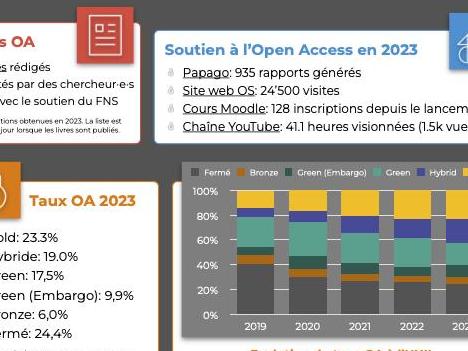
Open Science
Stratégie et plan d'actions.
Actualités
L’UNIL et la recherche d’aujourd’hui
Le plan d’intention 2017-2021 de la Direction de l’UNIL énonce que :
" Les chercheur·e·s - enseignant·e·s de l’UNIL dédient une part importante de leur temps à leurs activités de recherche et les fonds investis dans ces dernières sont considérables. Pour autant, la visibilité des résultats de ces recherches n’est pas acquise. Elle dépend essentiellement de la motivation de leurs auteur·e·s à les publiciser, au-delà de leur parution classique dans des revues scientifiques, des livres ou des actes de colloques. La recherche d’aujourd’hui est ouverte, participative et transdisciplinaire. (…)
La Direction de l’Université de Lausanne a l’intention d’adopter une politique de promotion très claire en faveur de l’ouverture, tant pour les publications (Open Access) que pour les données de recherche (Open Data). Cette politique d’ouverture doit être menée en collaboration avec les partenaires éditoriaux privilégiés, des chercheur·e·s de l’UNIL, (…) ainsi qu’avec les partenaires nationaux (…), le monde politique, les bailleurs de fonds, la communauté des chercheur·e·s ou le Consortium des bibliothèques universitaires suisses."
La stratégie Open Science (OS) de l'UNIL, validée par la Direction le 17 décembre 2019, met l'accent sur l'Open access et l'Open research Data. Elle s’inscrit dans la stratégie numérique 2019 de notre institution ainsi que dans la stratégie numérique du canton de Vaud élaborée par le Conseil d’État.
L'approche de l'UNIL en matière d'OS vise à répondre également au programme de législature 2017-2022 qui veut favoriser une science ouverte et participative ainsi qu’au Plan stratégique 2017-2022 de l’Université de Lausanne adopté par le Grand Conseil en mai 2019.
-
Stratégie Open Science de l'UNIL et plan d'actions (1 064Ko, .pdf)
Téléchargez la Stratégie et plan d'actions 2019-2021
Un plan d'action en 5 axes d'intervention
Pour mener à bien sa stratégie, l’UNIL a défini un plan d’actions en 5 axes prioritaires :
- La gouvernance : pour développer une politique Open Science, une stratégie, des processus et des directives à même de soutenir la vision de l’UNIL.
- L’organisation : pour mettre en place des structures administratives et de soutien qui garantissent une approche participative et inclusive des chercheur·e·s.
- Les infrastructures et les outils : pour fournir les moyens techniques de gérer, stocker, sécuriser, partager et archiver les informations scientifiques.
- La formation et le conseil : pour soutenir, accompagner et autonomiser les chercheur·e·s dans la gestion de leurs projets.
- Une nouvelle culture et la communication : pour sensibiliser la communauté et le public aux enjeux et opportunités de l’OS.










